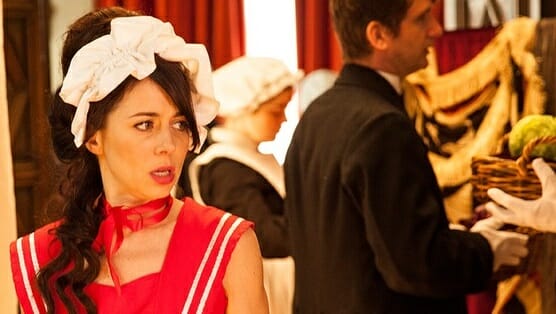Another Period: “Pageant”

It’s time for some good old fashioned objectification on this week’s episode of Another Period. According to matriarch Dodo, “In my day, a woman was judged only on her fertility, silence, and threshold for pain.” But the times, they are a-changin’. No longer simply categorized and valued based on their ability to breed, women’s appearances define their femininity and worth at the turn of the twentieth century. “Pageant” in many ways rehashes the well-trod beauty pageant storyline. Still, its particular lampoon takes the opportunity to not only poke fun at everything and everyone involved in such a display, but also the formulaic narrative seen in many a movie or TV show.
Newport’s Most Beautiful Pageant, yearly held at the Bellacourt’s mansion, may once have involved only vegetables (Dodo: “Only cabbages should be judged for their beauty!”), but in order to remain relevant the judges have broadened the show to include babies and women. To be clear, there are not separate categories for each one; the women, babies and vegetables compete together.
Learning that the winner will be featured on a biscuit tin, Lillian jumps at the chance to use her beauty as a commodity. Beatrice follows suit not because she especially understands what’s going on, but because she typically follows Lillian’s lead. And Hortense stands up for women’s liberation by entering the pageant to reveal its inanity.
Hortense’s plain presence naturally causes a stir. Host Dan Ringling (Jack Black in a wonderful cross between a 1920s circus ringleader and 1970s TV host Richard Dawson) quiets the murmuring explaining, “Though there is 100% certainty that she will not win, she is technically a female adult and therefore is allowed to enter.” The show has some cleverly overt lines that call attention to the traditional narrative structures they often engage. Rather than play these moments off as originality, Another Period has no problem openly calling attention to the beauty pageant narrative’s predictability.
The Bellacourt sisters and three other female contestants submit to a series of exams. Measuring their busts, derrieres and teeth, Rigley examines the women as one would a horse, ensuring each stock is of good quality. As they open their mouth wide for him to see their teeth, he explains he’s looking for “32 teeth, no yellows, no wooden.” While the exaggerated nature of the scene lampoons real beauty pageants, it’s not far off the mark. Women don’t submit themselves to the kind of examination Newport’s Most Beautiful Pageant requires, yet they do face a similar level of scrutiny when it comes to their bodies and appearance. Watching the bathing suit portion of any contemporary pageant reminds women about the parameters in which they should fall. Rigley may use an actual measuring instrument to gauge breast to hip ratio, but that same instrument certainly exists unseen in today’s competitions. There’s a certain standard of beauty women must meet to be considered not only women but desirable.